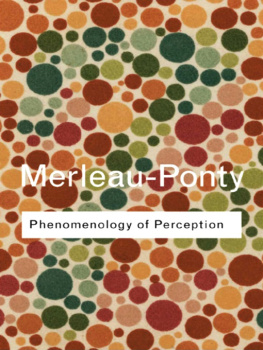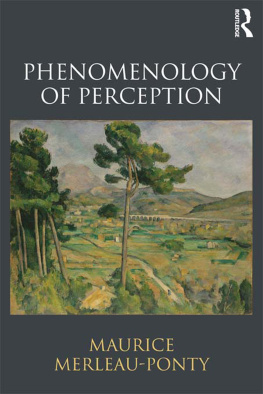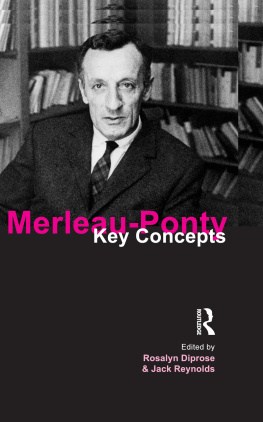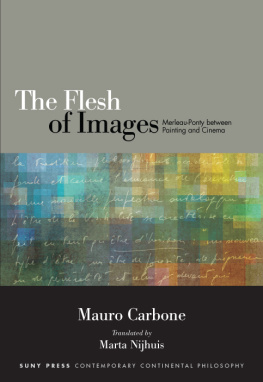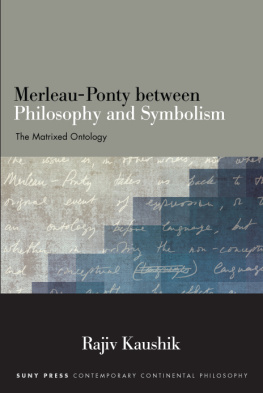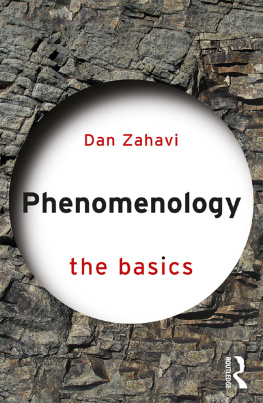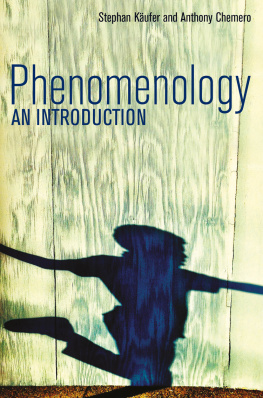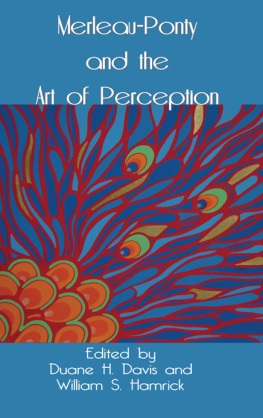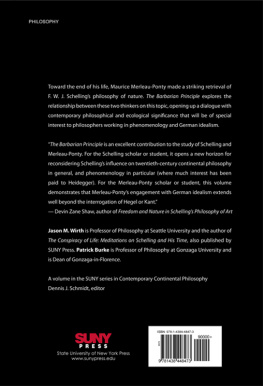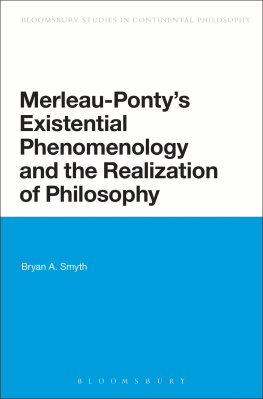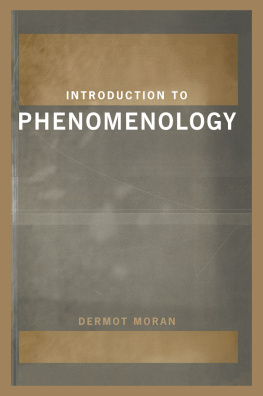Merleau-Ponty - Phenomenology of perception: an introduction
Here you can read online Merleau-Ponty - Phenomenology of perception: an introduction full text of the book (entire story) in english for free. Download pdf and epub, get meaning, cover and reviews about this ebook. City: London, year: 2002, publisher: Routledge, genre: Religion. Description of the work, (preface) as well as reviews are available. Best literature library LitArk.com created for fans of good reading and offers a wide selection of genres:
Romance novel
Science fiction
Adventure
Detective
Science
History
Home and family
Prose
Art
Politics
Computer
Non-fiction
Religion
Business
Children
Humor
Choose a favorite category and find really read worthwhile books. Enjoy immersion in the world of imagination, feel the emotions of the characters or learn something new for yourself, make an fascinating discovery.
- Book:Phenomenology of perception: an introduction
- Author:
- Publisher:Routledge
- Genre:
- Year:2002
- City:London
- Rating:4 / 5
- Favourites:Add to favourites
- Your mark:
- 80
- 1
- 2
- 3
- 4
- 5
Phenomenology of perception: an introduction: summary, description and annotation
We offer to read an annotation, description, summary or preface (depends on what the author of the book "Phenomenology of perception: an introduction" wrote himself). If you haven't found the necessary information about the book — write in the comments, we will try to find it.
Phenomenology of perception: an introduction — read online for free the complete book (whole text) full work
Below is the text of the book, divided by pages. System saving the place of the last page read, allows you to conveniently read the book "Phenomenology of perception: an introduction" online for free, without having to search again every time where you left off. Put a bookmark, and you can go to the page where you finished reading at any time.
Font size:
Interval:
Bookmark:
Phenomenology of Perception
In this text, the body-organism is linked to the world through a network of primal significations, which arise from the perception of things.
Michel Foucault
We live in an age of tele-presence and virtual reality. The sciences of the mind are finally paying heed to the centrality of body and world. Everything around us drives home the intimacy of perception, action and thought. In this emerging nexus, the work of Merleau-Ponty has never been more timely, or had more to teach us... ThePhenomenology of Perceptioncovers all the bases, from simple perception-action routines to the full Monty of conciousness, reason and the elusive self. Essential reading for anyone who cares about the embodied mind.
Andy Clark, Professor of Philosophy and Director of the Cognitive Science Program, Indiana University
Maurice
Merleau-Ponty
Phenomenology of Perception
Translated by Colin Smith

Phnomnologie de la perception published 1945
by Gallimard, Paris
English edition first published 1962
by Routledge & Kegan Paul
First published in Routledge Classics 2002
by Routledge
11 New Fetter Lane, London EC4P 4EE
29 West 35th Street, New York, NY 10001
Routledge is an imprint of the Taylor & Francis Group
This edition published in the Taylor and Francis e-Library, 2005.
To purchase your own copy of this or any of Taylor & Francis or Routledges collection of thousands of eBooks please go to www.eBookstore.tandf.co.uk.
1945 Editions Gallimard
Translation 1958 Routledge & Kegan Paul
All rights reserved. No part of this book may be reprinted or reproduced or utilised in any form or by any electronic, mechanical, or other means, now known or hereafter invented, including photocopying and recording, or in any information storage or retrieval system, without permission in writing from the publishers.
British Library Cataloguing in Publication Data
A catalogue record for this book is available from the British Library
Library of Congress Cataloging in Publication Data
A catalog record for this book has been requested
ISBN 0-203-99461-2 Master e-book ISBN
ISBN 0415278406 (hbk)
ISBN 0415278414 (pbk)
C ONTENTS
P REFACE
What is phenomenology? It may seem strange that this question has still to be asked half a century after the first works of Husserl. The fact remains that it has by no means been answered. Phenomenology is the study of essences; and according to it, all problems amount to finding definitions of essences: the essence of perception, or the essence of consciousness, for example. But phenomenology is also a philosophy which puts essences back into existence, and does not expect to arrive at an understanding of man and the world from any starting point other than that of their facticity. It is a transcendental philosophy which places in abeyance the assertions arising out of the natural attitude, the better to understand them; but it is also a philosophy for which the world is always already there before reflection beginsas an inalienable presence; and all its efforts are concentrated upon re-achieving a direct and primitive contact with the world, and endowing that contact with a philosophical status. It is the search for a philosophy which shall be a rigorous science, but it also offers an account of space, time and the world as we live them. It tries to give a direct description of our experience as it is, without taking account of its psychological origin and the causal explanations which the scientist, the historian or the sociologist may be able to provide. Yet Husserl in his last works mentions a genetic One may try to do away with these contradictions by making a distinction between Husserls and Heideggers phenomenologies; yet the whole of Sein und Zeit springs from an indication given by Husserl and amounts to no more than an explicit account of the natrlicher Weltbegriff or the Lebenswelt which Husserl, towards the end of his life, identified as the central theme of phenomenology, with the result that the contradiction reappears in Husserls own philosophy. The reader pressed for time will be inclined to give up the idea of covering a doctrine which says everything, and will wonder whether a philosophy which cannot define its scope deserves all the discussion which has gone on around it, and whether he is not faced rather by a myth or a fashion.
Even if this were the case, there would still be a need to understand the prestige of the myth and the origin of the fashion, and the opinion of the responsible philosopher must be that phenomenology can be practised and identified as a manner or style of thinking, that it existed as a movement before arriving at complete awareness of itself as a philosophy. It has been long on the way, and its adherents have discovered it in every quarter, certainly in Hegel and Kierkegaard, but equally in Marx, Nietzsche and Freud. A purely linguistic examination of the texts in question would yield no proof; we find in texts only what we put into them, and if ever any kind of history has suggested the interpretations which should be put on it, it is the history of philosophy. We shall find in ourselves, and nowhere else, the unity and true meaning of phenomenology. It is less a question of counting up quotations than of determining and expressing in concrete form this phenomenology for ourselves which has given a number of present-day readers the impression, on reading Husserl or Heidegger, not so much of encountering a new philosophy as of recognizing what they had been waiting for. Phenomenology is accessible only through a phenomenological method. Let us, therefore, try systematically to bring together the celebrated phenomenological themes as they have grown spontaneously together in life. Perhaps we shall then understand why phenomenology has for so long remained at an initial stage, as a problem to be solved and a hope to be realized.
It is a matter of describing, not of explaining or analysing. Husserls first directive to phenomenology, in its early stages, to be a descriptive psychology, or to return to the things themselves, is from the start a foreswearing of science. I am not the outcome or the meeting-point of numerous causal agencies which determine my bodily or psychological make-up. I cannot conceive myself as nothing but a bit of the world, a mere object of biological, psychological or sociological investigation. I cannot shut myself up within the realm of science. All my knowledge of the world, even my scientific knowledge, is gained from my own particular point of view, or from some experience of the world without which the symbols of science would be meaningless. The whole universe of science is built upon the world as directly experienced, and if we want to subject science itself to rigorous scrutiny and arrive at a precise assessment of its meaning and scope, we must begin by reawakening the basic experience of the world of which science is the second-order expression. Science has not and never will have, by its nature, the same significance qua form of being as the world which we perceive, for the simple reason that it is a rationale or explanation of that world. I am, not a living creature nor even a man, nor again even a consciousness endowed with all the characteristics which zoology, social anatomy or inductive psychology recognize in these various products of the natural or historical processI am the absolute source, my existence does not stem from my antecedents, from my physical and social environment; instead it moves out towards them and sustains them, for I alone bring into being for myself (and therefore into being in the only sense that the word can have for me) the tradition which I elect to carry on, or the horizon whose distance from me would be abolishedsince that distance is not one of its propertiesif I were not there to scan it with my gaze. Scientific points of view, according to which my existence is a moment of the worlds, are always both nave and at the same time dishonest, because they take for granted, without explicitly mentioning, it, the other point of view, namely that of consciousness, through which from the outset a world forms itself round me and begins to exist for me. To return to things themselves is to return to that world which precedes knowledge, of which knowledge always
Next pageFont size:
Interval:
Bookmark:
Similar books «Phenomenology of perception: an introduction»
Look at similar books to Phenomenology of perception: an introduction. We have selected literature similar in name and meaning in the hope of providing readers with more options to find new, interesting, not yet read works.
Discussion, reviews of the book Phenomenology of perception: an introduction and just readers' own opinions. Leave your comments, write what you think about the work, its meaning or the main characters. Specify what exactly you liked and what you didn't like, and why you think so.

